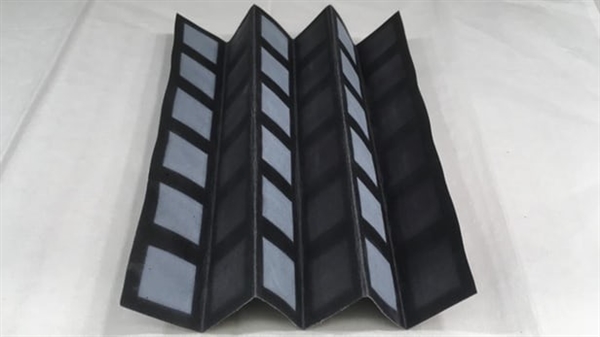 |
The development of battery technology is crucial for hardware devices. In some remote areas, it may not be possible to use the latest technology in a short period of time due to various factors such as excessive costs. Now, this situation may have to change.
According to New Atlas, a foreign media agency, Binghamton University in New York recently developed a low-cost, portable, and degradable battery specifically for remote areas. This type of bacteria-driven fuel cell has a similar appearance to chocolate.
It is understood that the Binghamton University team in New York City made this new battery more than a year after it was modified. At first it was just a simple device similar to Matchboard. Now it has become flexible enough to fold multiple times, more like a ninja dart. More importantly, the power of the battery also changes depending on the degree of folding.
In the latest version, the researchers replaced the previous version of the spray nickel bath with a silver nitrate tape on the cathode of the battery, and applied a thin layer of wax to the silver nitrate tape. The battery anode is made of water containing bacteria and placed in a container made of conductive polymer (these materials are very cheap and easy to obtain.) It is reported that the cathode and anode of the battery are placed on the Both ends of the paper. When the battery (chromatography paper) begins to fold, it forms a circuit where microbes can supply electricity.
In addition, the power and current generated when a bacterial battery is folded into different shapes will be different. For example, when a 6-cell battery pack is folded in a 2x3 ratio, it will produce 31.51 microwatts of electrical power and 125.53 microamps of current. When it is folded into a 6x6 style, 44.85 microwatts and 105.89 microamperes are produced. Of course, these numbers may not allow our smartphones to be fully charged, but they are already sufficient to charge some low-power biosensors, such as those that monitor the blood sugar of diabetics.
In some remote areas, or in wars and emergencies, this kind of low-cost, easily-accessible materials and practical cells with high biodegradability and convenience are very popular. “Through this research, we can use microorganisms to use any degradable substances, such as wastewater, for transient electricity generation. This is very useful in resource-constrained areas.†Seokheun Sean Choi, Principal Investigator, Binghamton University Indicated.
Currently, this research report has been published in the "Advanced Materials Technologies" journal. The team will also exhibit this new type of battery at the IEEE MEMS conference in January.

Router Tools, Wood Router, Plunge Router, Hand Router, Router for Wood, Router Cutter, Electrical Router, Woodworking Router, CNC Router
YongKang WALMA Tools CO., LTD. , http://www.walmatools.com